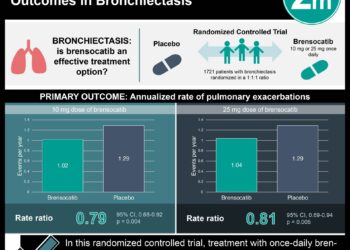Azithromycin lowers rate of infectious exacerbations in bronchiectasis patients
[tabs tab1=”2MM Rundown” tab2= “2MM Full Report”]
[tab]
Image: PD
1. In non-cystic fibrosis bronchiectasis patients, the azithromycin treated group had fewer rates of exacerbations vs. placebo group.
2. The azithromycin treated group had higher rates of gastrointestinal (GI) adverse effects and macrolide resistance.
In non-cystic fibrosis bronchiectasis patients, treatment with azithromycin lowered rates of infectious exacerbations, increased lung function and QOL (Quality of Life) measurements vs. the placebo group. The conclusions are in line with previous studies showing reduction in exacerbation following macrolide treatment. The increased macrolide resistance observed with azithromycin therapy is also in concordance with previous cystic fibrosis studies reporting high rates of resistance but without subsequent effect on pulmonary function. The strength of this study lies in its randomized controlled design, as well as its evaluation of azithromycin maintenance treatment over the course of a full year, which excludes seasonal effects on exacerbations. Nonetheless, further studies should examine consequences of increased macrolide resistance in these already infection-prone patients.
Click to read the study, published today in JAMA
[/tab]
[tab]
Image: PD
1. In non-cystic fibrosis bronchiectasis patients, the azithromycin treated group had fewer rates of exacerbations vs. placebo group.
2. The azithromycin treated group had higher rates of gastrointestinal (GI) adverse effects and macrolide resistance.
This [multicenter, double-blind, placebo-controlled, parallel-group] study: This study included patients with non-CF bronchiectasis from 14 hospitals in the Netherlands from April 2008 to September 2010. Patients were randomized to receive oral azithromycin or placebo for 52 weeks. The primary outcome was number of infectious exacerbations with 80% of placebo group having at least 1 exacerbation while 46.5% for azithromycin group had at least one exacerbation. Absolute risk reduction for the azithromycin group was 33.5% with the number of patients needed to treat being 3.0. Secondary outcomes included lung function (FEV1 improved by 1.03 per 3 months for azithromycin group) sputum bacteriology (53/60 or 88% macrolide resistant in azithromycin group vs. 29/112 or 26% in placebo group), inflammatory markers (no significant changes), and adverse effects (higher rates of diarrhea and abdominal pain in azithromycin group).
In sum: In non-cystic fibrosis bronchiectasis patients, treatment with azithromycin lowered rates of infectious exacerbations, increased lung function and QOL (Quality of Life) measurements vs. the placebo group. The conclusions are in line with previous studies showing reduction in exacerbation following macrolide treatment. The increased macrolide resistance observed with azithromycin therapy is also in concordance with previous cystic fibrosis studies reporting high rates of resistance but without subsequent effect on pulmonary function. The strength of this study lies in its randomized controlled design, as well as its evaluation of azithromycin maintenance treatment over the course of a full year, which excludes seasonal effects on exacerbations. Nonetheless, further studies should examine consequences of increased macrolide resistance in these already infection-prone patients.
Click to read the study in JAMA
By Elizabeth Park and Rif Rahman
More from this author: Trigger exposure in migraine patients results in migraine with aura only in a small subset of patients, Choosing a prenatal diagnostic test: Microarray analysis shown equal to karyotyping, STEMO unit delivery of tpa reduces call to needle time in acute stroke patients, High-dose multivitamin supplements do not decrease disease progression or death in HIV patients receiving HAART ,Pediatric patients not receiving quality palliative care despite agreement between parents and caregivers on valued elements of care ,Combined BRAF and MEK inhibition in metastatic melanoma significantly improves progression free survival
© 2013 2minutemedicine.com. All rights reserved. No works may be reproduced without written consent from 2minutemedicine.com. Disclaimer: We present factual information directly from peer reviewed medical journals. No post should be construed as medical advice and is not intended as such by the authors or by 2minutemedicine.com. PLEASE SEE A HEALTHCARE PROVIDER IN YOUR AREA IF YOU SEEK MEDICAL ADVICE OF ANY SORT. Content is produced in accordance with fair use copyrights solely and strictly for the purpose of teaching, news and criticism. No benefit, monetary or otherwise, is realized by any participants or the owner of this domain.
[/tab]
[/tabs]





![A word on stats [Perspective]](https://www.2minutemedicine.com/wp-content/uploads/2013/03/article-0-0F0CEFD300000578-3_470x790-111-75x75.jpg)

